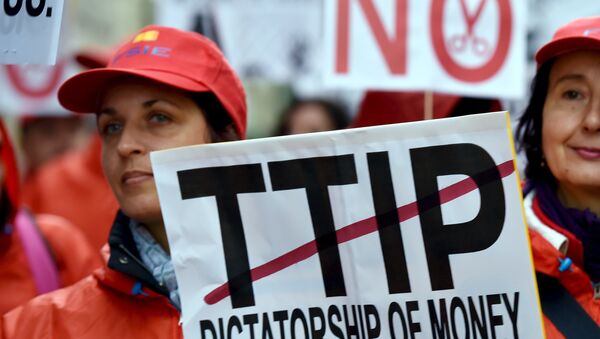WASHINGTON (Sputnik) — The Transatlantic Trade and Investment Partnership (TTIP) agreement may not get finalized until the end of 2017 or early 2018, despite US government vows to complete the deal before the end of President Barack Obama’s administration, former US Treasury official Gary Hufbauer told Sputnik.
On Friday, the week-long eleventh round of the TTIP talks wrapped up in Miami, Florida, during which negotiators were supposed to finalize the precise language of the agreement.
US chief negotiator Daniel Mullaney told reporters after the talks that it was critical to finish the TTIP negotiations during Obama’s presidential term, which comes to an end in January, 2017.
"Our thinking, and when I say our thinking I mean amongst the wonks in the think tank community, we are looking at a completed [TTIP deal] toward the end of 2017, and it could easily slip into 2018," Hufbauer said on Friday.
US officials, Hufbauer argued, have been claiming the deal will be consummated within the next year because they want to promulgate the illusion that TTIP is "an Obama deliverable."
In Miami this week, Hufbauer explained, US and European trade representatives agreed on 97 percent of approximately 8,000 tariff line items in the TTIP agreement, but the final three percent, somewhere between 200 and 300 lines, will be the toughest to negotiate.
"Those 200 or so lines is where the real juice is in terms of getting access to highly protected markets, and they are leaving that to the end, like hostages, so that other countries agree on stuff we [the United States] like," he noted.
Industries that are protected by higher tariffs have very powerful lobbyists, Hufbauer added, like cheeses, textiles, garments and ceramic goods in the United States, while Europe has its own sensitives around electronic and agricultural products.
The hotly-debated TTIP agreement seeks to deregulate trade between the United States and Europe and create the world's largest trade zone, encompassing more than 60 percent of global production.
The TPP deal comprises 12 nations of the Pacific Rim region, including the United States, Canada, Australia, Japan, New Zealand, Mexico, Taiwan, Peru, Brunei, Chile, Singapore and Malaysia.
Gary Hufbauer is a Senior Fellow with the Peterson Institute for International Economics. Previously, he served as US Treasury Deputy Assistant Secretary for International Trade and Investment Policy.




